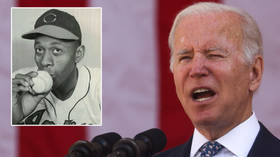Deputy prime minister of Poland calls for Russia & Belarus to face sports bans over border crisis
Poland’s deputy PM wants “much stronger” international pressure from the EU and NATO on Vladimir Putin and Alexander Lukashenko over the Polish-Belarusian border crisis, naming exclusion from sporting competition as one sanction.
The ongoing crisis on the border has seen tens of thousands of would-be asylum-seekers – most from conflict-ridden countries such as Iraq and Syria – attempt to reach the EU through Belarus.
Some NATO and EU member states have blamed Belarusian president Lukashenko, claiming that he is using the migrants as pawns.
Officials in Minsk have said that the EU is culpable, accusing it of introducing sanctions that have prevented effective border control.
Russian president Putin also vowed that his country had “absolutely nothing to do with any of this” in an interview with Rossiya-1 television.
“They are trying to shift the responsibility to us at the slightest pretext or even without any pretext,” he added, addressing claims by some EU officials that Russian flag carrier Aeroflot was involved in taking people from Middle Eastern countries to Belarus before they attempted to enter Poland or Lithuania.
Deputy Polish leader Piotr Glinski appears to believe those accusations are correct and wants Russia and Belarus to be banned from sporting competition, among a range of tough sanctions.
“If we fail – and this is a race against time – [to] sufficiently mobilize international institutions, including the EU and NATO, [to] incapacitate Lukashenko and Putin by obstructing the operation of the airlines, which is extremely difficult, [then] we may face very serious consequences,” Glinski warned the Polish Times via translation.
“The international pressure on these two regimes – Belarusian and Russian – should be much stronger.
“I would even consider the possibility of excluding these two countries from many international organizations, [and] from the sporting competition that is important to them.
“These are regimes that operate in an inhumane way, taking into account nothing but real economic or political pressure.”
Glinski said that the EU’s reaction has been insufficient. “It is late and it is inadequate,” he claimed.
“We regret this, and therefore we are working hard to ensure that the EU’s response is different.
“All of our services – the president, prime minister, minister of foreign affairs, the entire foreign service – are operational [on the crisis] every day.”








Comments are closed.